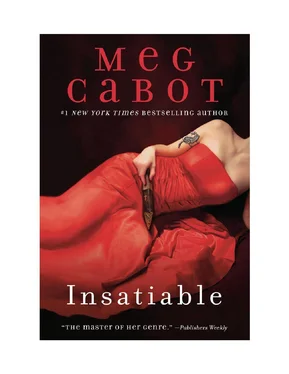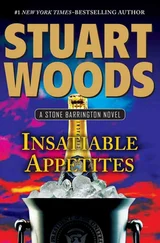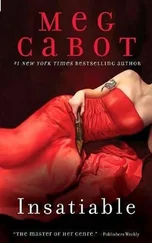Insatiable
Здесь есть возможность читать онлайн «Insatiable» весь текст электронной книги совершенно бесплатно (целиком полную версию без сокращений). В некоторых случаях можно слушать аудио, скачать через торрент в формате fb2 и присутствует краткое содержание. Жанр: Книги. Описание произведения, (предисловие) а так же отзывы посетителей доступны на портале библиотеки ЛибКат.
- Название:Insatiable
- Автор:
- Жанр:
- Год:неизвестен
- ISBN:нет данных
- Рейтинг книги:4 / 5. Голосов: 1
-
Избранное:Добавить в избранное
- Отзывы:
-
Ваша оценка:
- 80
- 1
- 2
- 3
- 4
- 5
Insatiable: краткое содержание, описание и аннотация
Предлагаем к чтению аннотацию, описание, краткое содержание или предисловие (зависит от того, что написал сам автор книги «Insatiable»). Если вы не нашли необходимую информацию о книге — напишите в комментариях, мы постараемся отыскать её.
Insatiable — читать онлайн бесплатно полную книгу (весь текст) целиком
Ниже представлен текст книги, разбитый по страницам. Система сохранения места последней прочитанной страницы, позволяет с удобством читать онлайн бесплатно книгу «Insatiable», без необходимости каждый раз заново искать на чём Вы остановились. Поставьте закладку, и сможете в любой момент перейти на страницу, на которой закончили чтение.
Интервал:
Закладка:
“Oh, no. But if you’d like to buzz up to the Antonescus,” Pradip said as he lifted the
receiver to the intercom, “I’m sure they’d be happy to—”
“Not necessary,” Alaric said, stretching his hand out in the internationally recognized
sign for stop . “I wouldn’t want to trouble them this late. Maybe I’ll drop by again some other
day, thanks.”
And he turned and left the building, Holtzman following closely behind him.
“Impressive,” his superior said to him. “Nice to see you using one of the techniques I
taught you for a change, instead of simply swinging that sword of yours around.”
“I try to avoid killing the civilian population whenever possible,” Alaric said, shooting
his boss an irritated look. “You taught me that as well, remember?”
“I remember,” Holtzman said. “But what exactly did you accomplish there, aside from
very likely alerting the Antonescus that we’re aware of them? You know that doorman is going
to tell them we were there. And we’re no closer to finding him.”
“No,” Alaric agreed. “But we have the name of the girl.”
“And what earthly good will that do us?”
“Oh,” Alaric said, “quite a lot of good, I imagine. Because she’s going to lead us straight
to him.”
Then he added thoughtfully, “If she lives through the night, that is.”
Chapter Twenty-seven
1:00 A.M . EST, Friday, April 16
Metropolitan Museum of Art
1000 Fifth Avenue
New York, New York
M eena had spent quite a lot of time in the Metropolitan Museum of Art, back when
she’d first moved to the city. She’d been especially drawn to a portrait of Joan of Arc by an
artist called Jules Bastien-Lepage, which hung in the nineteenth-century wing.
The painting showed Joan standing in the yard of her parents’ cottage, staring off into
space, apparently listening to the voices of saints. Ethereal, haloed figures floated behind
Joan’s back, seemingly whispering to her.
The painting wasn’t anything that special. Compared to other treasures the museum held,
it was considered one of the collection’s lesser works.
Still, Meena always made the canvas her primary destination upon entering the museum
and would, when she was feeling especially disheartened or hopeless, stand for nearly an hour
looking at it, in the company of similarly downtrodden souls.
But Prince Lucien didn’t lead Meena toward the nineteenth-century wing when he pulled
her into the Metropolitan Museum that night.
Instead, he guided her toward the medieval art exhibit on the main floor, through the
darkened, hushed Great Hall.
It was strange being in the museum after it was closed. Meena had never seen the halls
so empty…or so quiet.
She could actually hear her own heart thumping steadily with the excitement of what
they were doing—despite Lucien’s insistence that it was fine, she felt that there was something
illicit about their being there. Of course there was!
And now Lucien was holding her hand again.
His grip wasn’t exactly warm—his fingers always seemed a bit cool to the touch—but it
was oddly reassuring, the way it had been that night outside of St. George’s Cathedral.
And yet there was an almost boyish excitement about him, too, an eagerness with which
he seemed to want to show her the treasures the museum held. He playfully held a finger to his
lips as he guided her along.
“Are we going to set off any alarms?” Meena asked nervously, holding a squirming Jack
Bauer in one arm.
“Only if you try to steal something,” the prince jokingly replied.
“Oh, well, I guess I’ll have to restrain myself then,” Meena said, teasing him back. She
was pleased to see that a lively side to him was coming out. He may not have watched much
television, but he knew how to have fun.
Soon they were surrounded by hauntingly beautiful triptychs of the Madonna and child,
and bejeweled golden crucifixes that seemed to glow with the otherworldly light that came
from their display cases. Lucien steered her away from these and toward a collection of
fifteenth-century portraits and woodcuts. Meena couldn’t read the cards on the display cases
attached to the portraits because it was too dark, but Lucien explained, “These are of Prince
Vlad Tepes of Wallachia—you know, the man I was telling you about, the one who’s such a
hero in my country. He lived in the age of the first printing presses, so there’s a great deal of
historical documentation about him. His father, Vlad the Second, was a member of the Order
of the Dragon—established by the king of Hungary in order to unite neighboring kingdoms
against the Ottoman Empire. So Vlad Tepes was indoctrinated in the order as well…at the age
of five, right before his father handed him and his little brother over as hostages to the sultan of
the Ottoman Empire as a personal guarantee he wouldn’t attack the sultan while the boys were
under his roof.”
“Oh, dear,” Meena said, feeling slightly deflated. This story was a bit of a downer.
She supposed she wasn’t surprised to hear of Vlad’s father’s cruelty, giving his sons over
to a sultan in order to preserve peace, considering his image in the portrait. If Vlad Tepes
looked anything like his dad, he couldn’t have been very nice. He had a long, sinister-looking
black mustache and beady eyes.
Or maybe they just didn’t know how to draw very well back then. Meena had always
avoided this part of the museum. Her tastes tended to run more toward the Romantics….
Lucien didn’t seem to notice Meena’s dislike for the subject matter, however. As a
history professor, he was obviously very enthusiastic on the topic of his country’s greatest
forefather.
Lucien went on. “Although his brother was a great favorite of the sultan, the Ottomans
didn’t treat Vlad Tepes very well, I’m afraid. And when he finally did inherit the throne from
his father and return home to Wallachia, he was still quite bitter about the whole thing…and
things didn’t improve much for him after that, I’m afraid. He had an unfortunate life, filled
with much sorrow. His first wife, whom he dearly loved, was a beautiful and innocent young
woman. Some people even whispered that…well, that she was like an angel on earth.”
Meena raised her eyebrows upon hearing this, and she saw Lucien give her a quick
smile.
“Yes,” he said. “I thought you’d like that part of the story.”
He took her hand and led her toward a primitive black-and-white woodcut depicting a
turreted castle with a river running beneath it.
“Unfortunately,” he said in a voice that seemed carefully devoid of emotion to Meena,
“it doesn’t have the kind of ending you like. Vlad and his wife lived in warlike times. Upon
hearing their castle was under siege by the Turks—who were rumored to be unspeakably cruel
to royal female prisoners back in those days—his young bride threw herself out an upper-story
window, preferring death to what she thought she’d face at their hands.”
Meena sucked in her breath, her gaze flying to one of the high turrets pictured in the
woodcut.
“She fell into the river beneath the palace window and drowned,” Lucien continued in
the same emotionless tone. “That river is still referred to today as the Princess’s River.”
Читать дальшеИнтервал:
Закладка:
Похожие книги на «Insatiable»
Представляем Вашему вниманию похожие книги на «Insatiable» списком для выбора. Мы отобрали схожую по названию и смыслу литературу в надежде предоставить читателям больше вариантов отыскать новые, интересные, ещё непрочитанные произведения.
Обсуждение, отзывы о книге «Insatiable» и просто собственные мнения читателей. Оставьте ваши комментарии, напишите, что Вы думаете о произведении, его смысле или главных героях. Укажите что конкретно понравилось, а что нет, и почему Вы так считаете.




